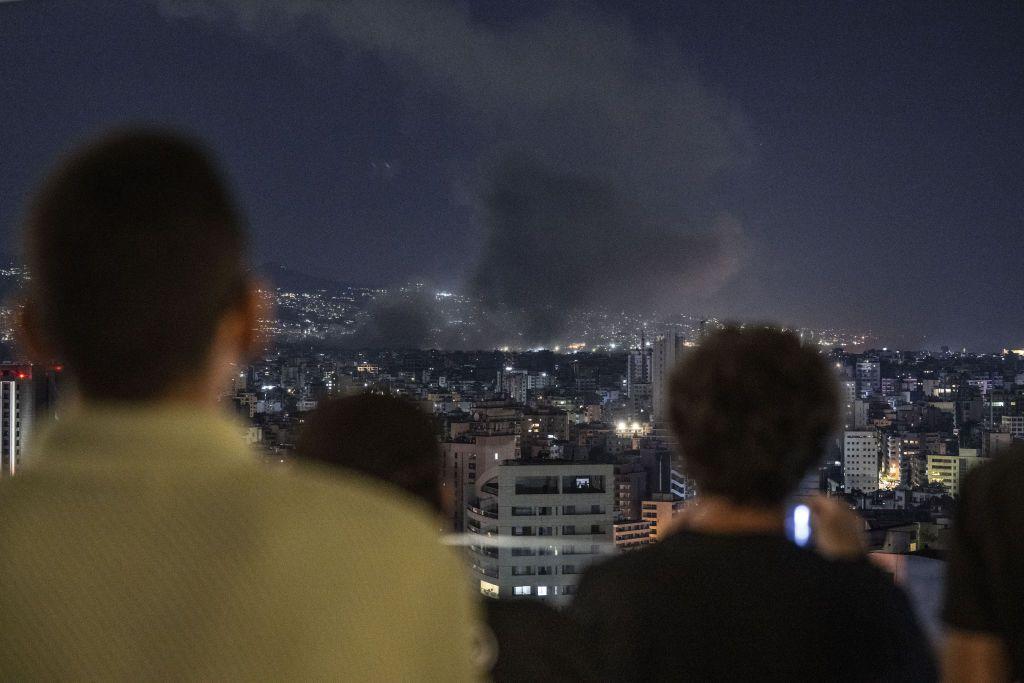In recent days, there was a feeling in Lebanon that an Israeli ground invasion in the south of the country was almost inevitable, that the Israeli campaign against Hezbollah would not stop with the death of Hassan Nasrallah, who for three decades was the face of the cluster.
Now that this has been confirmed, with what the Israeli military describes as a “limited, localized and selective” operation, the fear is that this could be the start of something bigger.
History shows that it is easy for Israeli troops to enter Lebanon, but difficult to leave.
“The country is lost,” a Lebanese friend wrote to me.
Another wrote: “If you ask me what is coming, my answer is that there will be very long and hard days ahead.”
A third said: “We can only hope for the best.”
There is a feeling that history is repeating itself and there is uncertainty about what will happen next.
It is not yet clear whether Hezbollah can mount a meaningful and coordinated response. It continues to launch rockets against Israel, but not with the same intensity.
Meanwhile, there is a country under pressure, struggling with the large number of victims of Israeli airstrikes and a million people who have already been displaced.
Hezbollah for the Lebanese
Hezbollah, as a Shiite Muslim group armed and financed by Iran, is considered a terrorist organization by the United Kingdom, the United States and other countries, but it is more than just a militia in Lebanon.
It is also a political party with representation in Parliament and a social movement rooted in Lebanese society that has significant support.

Powerful and influential, Hezbollah, which means “Party of God,” is often described as a state within a state in Lebanon. It has been weakened by two weeks of relentless Israeli airstrikes and high-level assassinations, but it has not been defeated.
In a defiant speech on Monday, Hezbollah’s number two, Naim Qassem, said his fighters were ready to resist any Israeli invasion.
Before this latest escalation, Hezbollah’s armed wing, which has a vast arsenal of weapons and thousands of battle-hardened fighters, was said to be stronger than the Lebanese army, and the country’s authorities have little to say – if they have anything to say – about the group’s actions.
A crisis that adds up
For almost a year, as Hezbollah carried out almost daily cross-border attacks against Israel, many outside its support base in Lebanon feared that this country, already struggling to recover from years of successive crises, would be drawn into a conflict that did not. has chosen to free.
The economy has practically collapsed, and political stagnation has meant that the country has been without a president for almost two years.
The last war between Israel and Hezbollah is still remembered here, in 2006, when parts of southern Lebanon and Dahieh, the group’s base in the southern suburbs of Beirut, were devastated.
Hezbollah’s rivals will not be disappointed to see a weakened group that many believe is focused on defending its own interests and those of its main supporter, Iran.

Hezbollah is the most powerful group in the so-called “axis of resistance,” an alliance of factions from across the Middle East supported by Iran that also includes the Houthis in Yemen and militias in Iraq and Syria.
Having a strong Hezbollah in Lebanon, right next to Israel, has always been vital for Iran, as part of its deterrent against any Israeli attack on its nuclear facilities.
On Monday, outside a building in downtown Beirut hit by an Israeli attack, a resident told me: “I am against Israel, which is killing us, but I am against Iran, which is also killing us.”
This is obviously rejected by Hezbollah supporters.
“We shed tears of blood for the attack [israelí] against Nasrallah, may God grant him paradise… He is irreplaceable,” said one of them, after being forced to flee Dahieh.
“We do not fear [a Israel]. We are still standing.”

click here to read more stories from BBC News World.
You can also follow us on YouTube, instagram, TikTok, x, Facebook and on our new channel WhatsAppwhere you will find breaking news and our best content.
And remember that you can receive notifications in our app. Download the latest version and activate them.
- Iran launches a missile attack against Israel and Netanyahu assures that Tehran “made a big mistake and will pay for it”
- What is the “axis of resistance”, the alliance led by Iran against Israel that includes Hezbollah, the Houthis and Hamas
